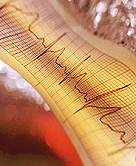 |
 |
 |
||
    |
||||
|
||||

Abnormal Heartbeat After Bypass a Bad Sign
Atrial fibrillation ups long-term risk of dying, researchers report|
|
HealthDay
Friday, April 24, 2009
 FRIDAY, April 24 (HealthDay News) -- People who develop the heartbeat abnormality called atrial fibrillation after heart bypass surgery are at increased long-term risk of dying, a new study finds.
FRIDAY, April 24 (HealthDay News) -- People who develop the heartbeat abnormality called atrial fibrillation after heart bypass surgery are at increased long-term risk of dying, a new study finds.
The report sounds a warning bell for doctors about an issue that has not been a matter of major concern, said Giovanni Filardo, director of the department of epidemiology at the Baylor University Medical Center Institute for Health Care Research and Improvement. He was to present the findings Friday at an American Heart Association meeting in Washington, D.C.
"After this surgery, almost 50 percent of patients develop atrial fibrillation," Filardo said. "Historically, it has been regarded as a transient problem, and therefore surgeons have not paid too much attention to it."
But data on almost 7,000 people who had bypass surgery at Baylor between 1997 and 2006 revealed a 29 percent higher death rate among those who did not have atrial fibrillation before the bypass but developed it after the procedure, he said.
The 10-year mortality rate was 47.7 percent for those who developed postoperative atrial fibrillation, compared to 30.6 percent for those who did not.
It's not clear whether the increased risk is directly due to atrial fibrillation, a condition in which the upper chambers of the heart quiver rather than pumping properly, allowing blood clots to form, Filardo said. "We don't know whether the atrial fibrillation might be a marker for something else," he said.
A second study to determine whether atrial fibrillation is itself responsible for the increased risk is in the planning stage, Filardo noted. "We hope to start early next year," he said.
The new study will include only people who do not have atrial fibrillation before they undergo bypass surgery. "If they develop atrial fibrillation, we will study the results in those who receive optimal treatment for the arrhythmia and those who do not," Filardo said. "We now have no data on the death rate of people treated with optimal care for atrial fibrillation after a bypass."
Atrial fibrillation after bypass surgery has not been regarded as a major problem, said Dr. Gregg Fonarow, a professor of medicine at the University of California, Los Angeles, and a spokesman for the American Heart Association
"It was regarded as something that might prolong the length of stay in the hospital and require additional management, but it has not been appreciated that it might be associated with an increased long-term risk of mortality," Fonarow said.
He agreed that the exact role of atrial fibrillation in the risk equation is not known. The heart rhythm abnormality tends to occur in people who are at higher risk because they are older and have other medical problems, Fonarow said.
Still, attention must be paid when atrial fibrillation is detected after a bypass operation, he said. "These patients should be recognized as being at higher risk," Fonarow said. "They should be monitored closely and appropriate treatment should be applied."
HealthDay
Copyright (c) 2009 ScoutNews, LLC. All rights reserved.
Related News:
More News on this Date
Related MedlinePlus Pages:
| Home | Health Topics | Drugs & Supplements | Encyclopedia | Dictionary | News | Directories | Other Resources | |
| Disclaimers | Copyright | Privacy | Accessibility | Quality Guidelines U.S. National Library of Medicine, 8600 Rockville Pike, Bethesda, MD 20894 National Institutes of Health | Department of Health & Human Services |
Date last updated: 27 April 2009 |
